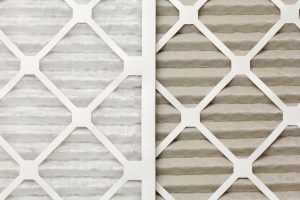
We offer several ways to help local homes enjoy cleaner, healthier indoor air, such as installing a powerful air purifier in St. Petersburg, FL. But when most homeowners get started with indoor air quality improvements, they first look at air filtration systems. These are the baseline for healthier air: they physically trap particles trying to circulate through the HVAC system. Professionals only have to find the right types of filters and integrate them into the ductwork and they’ll start doing their job.
Let’s go back to that last sentence: the right types of filters. This is a key part of air filtration installation, and one of the reasons it’s necessary to have professionals handle the job. The strength of an air filter can make or break an indoor air quality installation. In this post, we’ll examine in more detail air filter strength and its impact.
MERV Rating
Air filters have a rating of their strength: MERV (minimum efficiency reporting value). This was developed by ASHRAE (American Society of Heating, Refrigerating and Air-Conditioning Engineers; and apologies for all these acronyms) as a standardized rating for filters. The higher MERV, the smaller the particles the filter can stop.
MERV ratings go from 1 to 20, although for a home you won’t have to think about anything higher than 16 at most. The reason for this is that a stronger filter puts more resistance against airflow, so a MERV rating that’s too high will prevent air from circulating through the HVAC system and can end up damaging it.
Let’s look at some of the ranges of MERV and how well they fit specific purposes.
- MERV 1 to 4: This is standard for window ACs as well as the basic filters found on HVAC cabinets that stop large particles from getting into the heating and air conditioning system. These filters are not much use for improving air quality, only preventing internal system damage. You do need that HVAC filter in place, but if you want better air quality, you’ll probably need to go higher.
- MERV 5 to 8: This is a common range for many residential homes looking for cleaner air. These filters can stop dust, dust mites, lint, dander, as well as some smaller harmful particles. If your home can’t handle a filter stronger than this, it’s best to pair it with an air purifier.
- MERV 9 to 12: These filters are effective at trapping small particulates, including some gases, odor molecules, and chemicals. They can also make an improvement for the dustiness of a house. They work well for homes with people who have asthma and allergies—but not all HVAC systems are powerful enough for them.
- MERV 13 to 16: These filters are the most powerful available that aren’t HEPA-rated (the common types of hospitals and other healthcare facilities). They can stop contaminants as small as viruses and bacteria. Again, not all home HVAC systems can handle them.
You can trust our air filtration experts will find the ideal MERV rating filters for your home needs.
The A/C Guy of Tampa Bay Inc. serves our Tampa Bay Family with integrity and honor! Call today for great air filtration and air purification solutions for your house.

